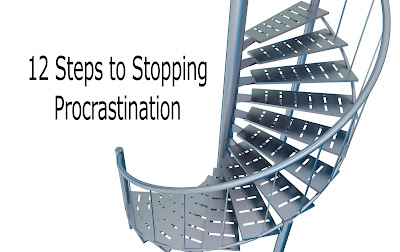 |
| “Only put off until tomorrow what you are willing to die having left undone” ― Pablo Picasso |
There are a number of reasons for procrastinating, so your first task is to determine why you are procrastinating. Are you afraid of failure? Do you fear success? Do you have a little negative voice in your head telling you that nothing you do is ever good enough?
Once you discover the reasons for procrastinating, you can take steps to make procrastination a thing of the past and enjoy a more successful life. Here are twelve strategies you can try:
1. Do the hardest and most unpleasant tasks first
Get them out of the way so you can feel proud of what you’ve accomplished. Everything else will seem easy after that.
2. Break down big projects into smaller ones
Do a little bit, then move on to another part of the project. Eventually these blocks of work will all add up to a complete project.
3. Schedule work time and break time
Sometimes you don’t need long hours to complete a task - just consistent, focused effort for short periods of time. Work for 25 minutes, then take a break for five minutes. Do this for four sessions, then give yourself a reward of a longer break such as 15 to 30 minutes. Continue in this manner until you complete the task, and then move to the next item on your to-do list.
4. Transform your tasks
If you find the task dull, boring or difficult, turn these negatives into a positive. For example, if it is dull, promise yourself a reward once it is done. If the task is difficult, what wonderful new things will you learn in the process of accomplishing it?
5. Avoid perfectionism
Remember that it does not have to be perfect; it just needs to get done. Do your best, but don’t miss a deadline either.
6. Keep your work area organized
Make sure you have everything you need to do the job in the same place. Also keep your computer organized by using folders and file names with keywords in them that accurately describe the contents.
7. Ask for help if you need it
Often a project might just seem too overwhelming. Ask others who have the skills you need to help you get the job done.
8. Reward yourself after the work is complete
Do something nice in your breaks. Organize a fun activity once the work is finished.
9. Manage your time
Use planners and diaries to keep track of all deadlines. Give yourself a cushion so you are not stressed and working down to the wire.
10. Establish your priorities
Deadlines are a fact of life. Determine what must be done first, but be prepared to switch from one task to another if your current assignment is due at the end of the week but a new one comes in that needs to be done by the end of the day.
11. Focus on finishing
Don’t work hard for a while and then just peter out. Stay focused on getting to the end even if it means pushing through. Edit as needed once the job is done.
12. Turn off your inner critic
As you are working, just let it flow. If you are writing, don’t agonize over every word or typo. Review and edit it all at the end as you push towards your deadline.
Once you have tackled the bad habit of procrastination, you will soon start to create an impressive track record of accomplishments of which you can be justly proud.

